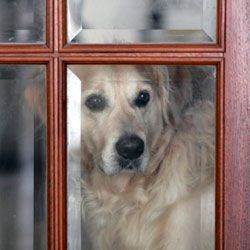The bond between humans and dogs dates back at least 12,000 years [source: National Institutes of Health]. Long before our predecessors learned to cultivate crops, they developed a mutually beneficial relationship with wolves, which eventually led to their domestication. Now, dogs live with us as protectors and companions. But should they live exclusively indoors?
"Not in most situations," said Dr. David Sewell, veterinarian and co-owner of Crestview Animal Hospital in Cumming, Ga. "Dogs need to be outside for exercise and for their mental well-being. It makes them happier."
Advertisement
Our dogs enrich our lives and improve our health, so it's natural to want to protect them. But keeping them inside doesn't do that. Disease-causing pathogens can walk into your home on shoes, with groceries or in your latest online shopping order. Dogs that aren't exposed to germs through outdoor play are actually more at risk for getting a disease because they haven't developed antibodies to fight off infections. Keeping canines indoors isn't a guarantee against pests like fleas, ticks and heartworm-carrying mosquitoes, either -- these critters are stopped by doors.
Confinement also creates health problems like obesity and diarrhea [source: Swift]. Most indoor dogs don't get enough exercise, and they don't have the balance of internal microbes required to develop a healthy intestinal structure. Indoor dogs also need more of certain vitamins than doggies that spend a lot of time outside do [source: Kil and Swanson]. And just like caged animals at a zoo, captive dogs can develop behavioral and emotional problems [source: Ohio State University].
So, going outside keeps dogs physically and emotionally fit. They need to run, jump, chase and swim, but neither small nor and very large dogs should jog with you [source: Paige]. Distance-running hurts the joints of small dogs, and large breeds like Great Danes are susceptible to heart problems and fractures in their ankles and feet. Very young, very old, obese or ailing pups need gentle exercise, like swimming [source: Swift]. Even canines that lack the energy for play benefit from the stimuli of outdoor smells, sounds and sights.
If you're home all day, let your dog have short but frequent outdoor breaks. If your pet is alone for hours at a time, longer walks and play sessions help keep his weight under control and improve your loving bond.
That said, some health or environmental factors warrant keeping a dog indoors, at least temporarily. See what they are on the next page.
Advertisement


